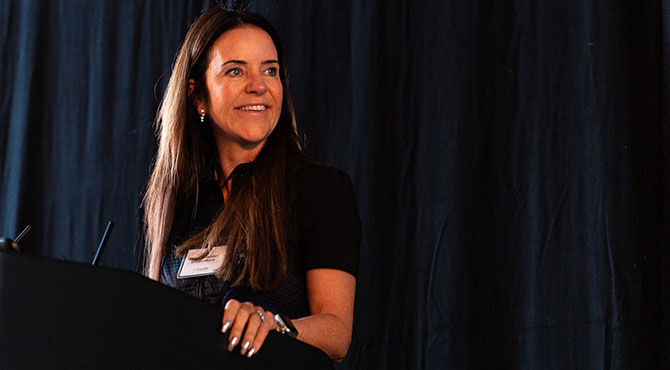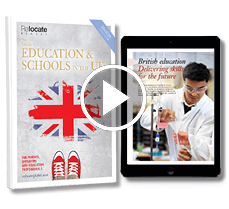How employers and schools can forge closer ties to nurture future talent
Following her keynote speech at the Festival of Global People, Marianne Curphey talks to Angela Middleton MBE, author of Bridge That Gap and founder of apprenticeship training provider MiddletonMurray, about the challenges facing young people heading out into the modern world of work.

Now available as an ebook on Amazon! Simply download from Amazon onto your Kindle, mobile phone or tablet to read wherever you are!
During her keynote speech on How employers can support schools, young people and their career ambitions, Angela Middleton talked about the gap between leaving school and gaining a first job, and how schools and employers can make the transition into the workplace a better experience. “Young people are leaving school with a lack of vision and a lack of self-belief,” she said. “They don’t know what they are capable of. Schools are still driven by Ofsted and they want to provide vision and a life plan for students, but they have to achieve academic standards.”Middleton’s presentation examined the partnership that needs to be generated by schools and employers, so that the transition into the workplace is made easier by the career experience gained while at school through work experience.
Watch highlights from the Festival:
Employers could address the challenge by creating a global online community with schools using LinkedIn. They could offer work experience placements and they could share job specifications with schools in order to help young people get an idea of the skills and qualifications they will need in the future workplace. Middleton added that employers could also offer taster days and develop a plan for new entrants. “Parents and teachers could also play their part, helping children to think about what sectors they might like to work in for the future and how school helped them to achieve their employment goals,” she said.Encouraging a future fit workforce
During her presentation and panel discussion on the Future fit workforce – tech AI and beyond, Middleton talked about how software and digital jobs now each made up 10% of posts currently being advertised and that digital marketing is now taking over from telesales. Camila Bolen of NYC Navigator discussed how the Millennial workforce was interested in a better work-life balance and how online review sites meant potential candidates would check out the ratings of companies as a place to work before they applied for a job.“Employers need to forge closer links with schools, colleges and universities to help identify and nurture talent and help young people prepare better for the world of work,” added Middleton.Middleton believes that most education professionals will concede that there is a chasm between school careers advice and the reality for young people in gaining the skills that will help them make it in the real world of employment. Her firm MiddletonMurray takes a holistic view of the job market to maximise the chance that the right candidate gets placed with the right employer. “I understand that schools are not geared up to be careers advisers,” she said. “They are judged on their academic output and they understandably focus on this job primarily. If they do decide that they are going to give careers guidance they may not be in the best position to do it, as they are educational and academic professionals and not business people.”She said that thinking about careers has to be embedded in the curriculum, preferably with students thinking about potential job options from Year 7. This might include discussions between teachers and parents at parents’ evening about subjects that the child finds interesting.This way, by focussing on in the future, students are thinking about personal development and the value of what they are studying in school. “It’s about making sure that those conversations are taking place,” Middleton said. “It’s helping them make sense of the world of work. That way, students see school as a means to an end and it gives them an incentive and makes them much more engaged with the learning process. The problem for many teachers is that they spend a lot of time in behavioural management.”Engaging with schools and colleges
Another way to build engagement within schools is to encourage employers to visit schools and colleges and talk about careers in their industry to give students a flavour of what is involved. For employers, it is also an opportunity to spot talent. “They get to see the potential candidates and what talent is available,” she explained. “It works both ways. It would be great if employers had much more contact with schools, colleges and universities.”Another area where employers could be proactive is in helping students with interview tuition and practice. “It can be helpful for them to come in and role-play interviews so that students can get a feel for what the interview process is really like,” she advised. “Then, students will be a bit better versed in the process and will be able to put their best foot forward when they are having a job interview for real.”One of the issues for organisations is that work experience opportunities are not well co-ordinated and the process can be somewhat haphazard. Middleton suggests a remedy would be to ensure that there is a single point of contact and responsibility with the company to help with continuity. “Employers should have a permanent work experience slot, which is organised by one person with responsibility for that,” she said. “It is much harder to organise and facilitate if it is done on an ad-hoc basis.”Although there has been much controversy over unpaid internships – with some quarters criticising them as being accessible only to wealthy students who can pay their own accommodation costs, Middleton believes that if a young person is determined, they will find a way. “Unpaid internships are possible if you really want to do them,” she said. “It might involve sleeping on friend’s sofas, but we all have to start at the bottom and work our way up.“I do think employers should be paying travel expenses, but they should not have to pay students for their time. At this stage, the student is not able to contribute anything to the organisation, but in return, they are getting something that money can’t buy – the experience of working for that company.”Students should also be putting together a portfolio of work, so that they can showcase what they have done to the wider world via digital means, she said. “They can start to post articles on LinkedIn and upload podcasts to YouTube – in this digital age you can’t just write a CV in the traditional way – you need to use all the tools that are available to you.”Students from overseas can also make the most of their opportunities, perhaps by taking an initial job to improve their language skills and get some experience before moving onto a job that will help them progress in their careerSkills shortages
As for the skills shortages, this is something that will be a challenge to HR departments and recruiters in the future. “We have already seen the effect of Brexit with a lot of talent deciding not to come to the UK,” said Middleton.“Companies are having to stop relying on recruiting from overseas and focus instead on their existing staff. They are going to have to put together programmes to make the most of their internal talent to develop and retain the best people.”About Angela Middleton
Author of How to get your first job and build the career you want, a step-by-step guide for 16-24-year-olds on how to choose the right career, Middleton’s new book, Bridge That Gap! How Schools Can Help Students Get Their First Job and Build the Career They Want has been written to help teachers who really care about the futures of their pupils and want to prepare them for the world of work.She is also the founder of MiddletonMurray, an award-winning Apprenticeship training provider and Apprenticeship Levy consultancy. Launched in 2002, MiddletonMurray has built a bespoke apprenticeship programme, which educates young people on their options and provides a vocational alternative to traditional university education via an Apprenticeship scheme, leading to real jobs and careers.Career guidance for students and schools
Angela Middleton will be launching a book and podcast tour for UK schools. She is also researching a new book for employers to help them bridge the gap with schools. Keep up with her activities via Middletonmurray.com, bit.ly/angelamiddletonyoutube.Festival Sponsors:
Festival Supporters:
Access hundreds of global services and suppliers in our Online Directory
 Get access to our free Global Mobility Toolkit
Get access to our free Global Mobility Toolkit  ©2019. This article first appeared in the Summer 2019 edition of Relocate magazine, published by Profile Locations, Spray Hill, Hastings Road, Lamberhurst, Kent TN3 8JB. All rights reserved. This publication (or any part thereof) may not be reproduced in any form without the prior written permission of Profile Locations. Profile Locations accepts no liability for the accuracy of the contents or any opinions expressed herein.
©2019. This article first appeared in the Summer 2019 edition of Relocate magazine, published by Profile Locations, Spray Hill, Hastings Road, Lamberhurst, Kent TN3 8JB. All rights reserved. This publication (or any part thereof) may not be reproduced in any form without the prior written permission of Profile Locations. Profile Locations accepts no liability for the accuracy of the contents or any opinions expressed herein.©2026 Re:locate magazine, published by Profile Locations, Spray Hill, Hastings Road, Lamberhurst, Kent TN3 8JB. All rights reserved. This publication (or any part thereof) may not be reproduced in any form without the prior written permission of Profile Locations. Profile Locations accepts no liability for the accuracy of the contents or any opinions expressed herein.








































